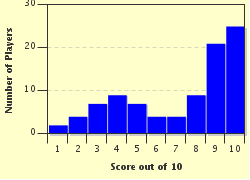Quiz Answer Key and Fun Facts
1. The first mention of snow in the NKJV Bible is Exodus 4:6 and it's used to describe the dread disease leprosy. The verse states: "Furthermore the LORD said to him, 'Now put your hand in your bosom.' And he put his hand in his bosom, and when he took it out, behold, his hand was leprous, like snow." What is the name of the man who was afflicted with leprosy for an ever-so-brief period of time on his hand?
2. Numbers 12:10 tells of a woman suddenly becoming leprous, "as white as snow". Scripture goes on to say when Aaron turned and looked toward his sister, "there she was, a leper." What was the woman's name?
3. 2 Kings 5:27 tells of yet another occasion when snow is used to describe leprosy. The verse tells of Elisha the prophet informing his servant he would be struck with leprosy as punishment for illegally obtaining a reward from Naaman. (According to Scripture, Elisha had just cleansed Naaman of leprosy.) What is the name of Elisha's servant who developed leprosy and was "as white as snow?"
4. 1 Chronicles 11:22 tells of one of David's 'mighty men' killing a lion "in the midst of a pit on a snowy day." Who was the lion killer?
5. Scripture in the Hebrew Bible, or the Old Testament of the English Bible, tells of a man beset by troubles making the following statement that contains the word snow: "As drought and heat consume the snow waters, so the grave consumes those who have sinned." Who is the speaker?
6. Psalm 51 is one of more famous Psalms written by David. Verse 7, in the NKJV, states:
"Purge me with hyssop, and I shall be clean;
Wash me, and I shall be whiter than snow."
Shortly after what event in his life did David write the words?
7. The following verse, containing the word snow, is from the NKJV:
"He gives snow like wool;
He scatters the frost like ashes."
In what book of Hebrew Bible, or the Old Testament of the English Bible, do you find this verse?
8. Complete the missing word from Proverbs 26:1 in the NKJV:
"As snow in summer and rain in harvest,
So honor is not fitting for a ______."
9. The following verse, containing the word snow, is from the NKJV. "'Come now, and let us reason together,' says the LORD, 'Though your sins are like scarlet, They shall be as white as snow; Though they are red like crimson, They shall be as wool." In what book of the Hebrew Bible, or the Old Testament of the English Bible do you find this verse?
10. It's yet another case where 'snow' is used as a description. Revelation 1:14, in the NKJV, tells of John of Patmos having a vision with the verse stating: "His head and hair were white like wool, as white as snow, and His eyes like a flame of fire." Many Christians believe this verse is in direct reference to Jesus Christ.
Source: Author
Cowrofl
This quiz was reviewed by FunTrivia editor
CellarDoor before going online.
Any errors found in FunTrivia content are routinely corrected through our feedback system.

